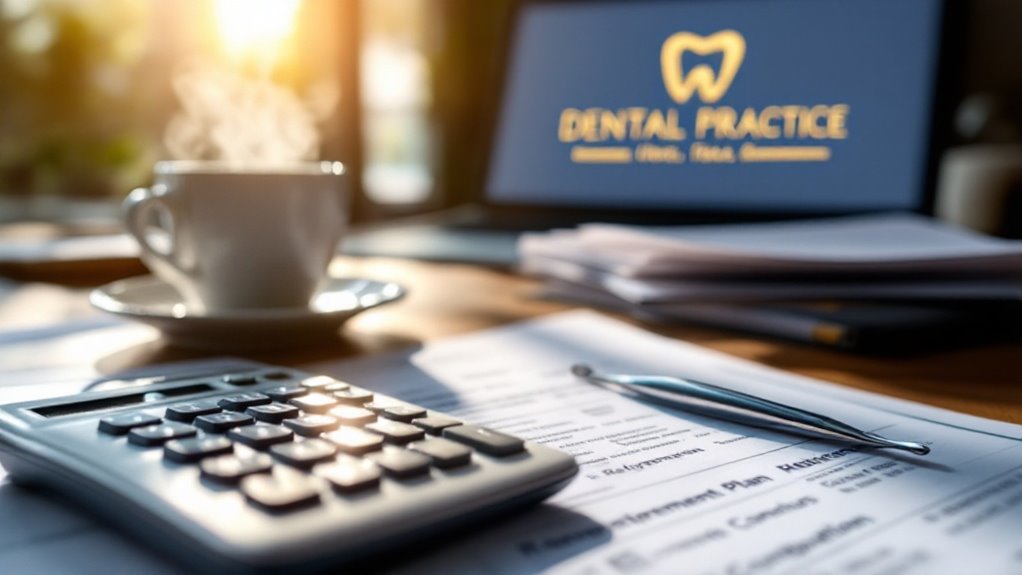Envision your practice thriving with patients, yet you're still looking for ways to keep more of your hard-earned income. As a dentist, you're in a unique position to take advantage of several tax deduction opportunities that can lighten your financial load. From retirement plan contributions that not only reduce taxable income but also grow tax-deferred, to deductions for business expenses that might surprise you, there are strategies worth exploring. What are these top three deductions, and how can they benefit your practice financially?
Key Takeaways
- Contributions to retirement plans like 401(k) and SEP IRA reduce taxable income and provide tax deferral benefits.
- Utilize the Qualified Business Income Deduction (QBID) to deduct up to 20% of qualified business income, maximizing tax savings.
- Fully deductible expenses include dental supplies, employee salaries, and office equipment, enhancing overall business deductions.
- Investments in technology, such as computers and dental software, qualify for full deductions in the year of purchase.
- Regularly review and document all business expenses to identify additional deductions and ensure compliance with IRS regulations.
Retirement Plan Contributions

When you contribute to retirement plans like a 401(k), SEP IRA, or SIMPLE IRA, you can greatly reduce your taxable income.
These contributions are often tax-deductible, allowing you to lower your tax bill while saving for the future. By maximizing your retirement planning efforts, you could benefit from tax deferral, postponing taxes on both your contributions and earnings until you withdraw them.
This strategy enhances your compounding growth over time. Plus, employer contributions to a 401(k) serve as a tax-deductible business expense, boosting your tax savings.
Don't overlook the Retirement Plans Startup Costs Tax Credit, either; it can give you a dollar-for-dollar reduction in taxes for setting up a new retirement plan, up to $5,000 for qualified expenses.
Qualified Business Income Deduction
If you're a self-employed dentist, the Qualified Business Income Deduction (QBID) can be a game changer for your tax strategy. This allows you to deduct up to 20% of your qualified business income from your taxable income, greatly lowering your tax liability.
QBID is particularly beneficial for self-employed dentists operating as pass-through entities like S corporations or sole proprietorships. However, be mindful of income phase-out limits; for 2023, single filers over $182,100 and married couples above $364,200 may see reduced deductions.
Additionally, since dentistry falls under healthcare, you'll need careful tax planning to maximize your benefits. If you own rental properties, you might also qualify for QBID, provided you meet the active participation criteria.
Business and Operating Expenses

Running a dental practice involves various business and operating expenses that can greatly impact your bottom line. You can fully deduct costs like dental supplies, employee salaries, and office equipment, which markedly reduces your taxable income.
For instance, office supplies, including paper and ink cartridges, are deductible at 100% in the year you purchase them, maximizing your tax benefits. Salaries for your dental staff, like hygienists and receptionists, qualify as ordinary business expenses, allowing for considerable savings.
Don't forget about technology investments, such as computers and dental software, which enhance efficiency and are also deductible. Keep thorough documentation of all expenses to guarantee compliance with IRS regulations and protect against potential audits.
Frequently Asked Questions
What Dental Services Are Tax Deductible?
You can deduct various dental expenses, including dental supplies, professional fees, and office rent. Additionally, itemized deductions for continuing education, travel expenses, insurance premiums, and employee benefits can greatly reduce your taxable income.
What Is the Qualified Business Income Deduction for a Dentist?
Deducting dollars? The Qualified Business Income deduction lets you, as a dentist, reduce taxable income by 20%. Understand eligible income, deduction limits, and business structure to maximize tax benefits during financial planning and tax filing!
Can You Get a Tax Credit for Dental Work?
You won't typically get a tax credit for dental work, but you can claim deductions for dental expenses under IRS guidelines. Proper financial planning and understanding insurance coverage can enhance your tax strategies during tax filing.
What Is a Write-Off in Dentistry?
A write-off in dentistry refers to deducting dental expenses like equipment write-offs, employee salaries, and office supplies. You can also claim tax benefits for continuing education, business travel, insurance premiums, and retirement plans for your practice.
Conclusion
By leveraging these top tax deduction opportunities, you can sculpt a brighter financial future for your dental practice. Retirement plan contributions not only shield your income but also pave the way for tax-deferred growth, while the Qualified Business Income Deduction acts as a financial cushion for self-employed dentists. Don't overlook your business expenses, either—every deductible dollar counts. Adopt these strategies, and watch your taxable income shrink, allowing you to focus on what truly matters: your patients and your practice.


